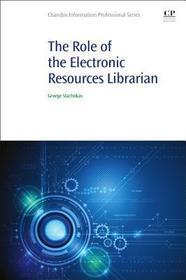
The Role of the Electronic Resources Librarian
Series: Chandos Information Professional Series;
- Publisher's listprice EUR 69.95
-
29 011 Ft (27 630 Ft + 5% VAT)
The price is estimated because at the time of ordering we do not know what conversion rates will apply to HUF / product currency when the book arrives. In case HUF is weaker, the price increases slightly, in case HUF is stronger, the price goes lower slightly.
- Discount 10% (cc. 2 901 Ft off)
- Discounted price 26 110 Ft (24 867 Ft + 5% VAT)
Subcribe now and take benefit of a favourable price.
Subscribe
29 011 Ft

Availability
printed on demand
Why don't you give exact delivery time?
Delivery time is estimated on our previous experiences. We give estimations only, because we order from outside Hungary, and the delivery time mainly depends on how quickly the publisher supplies the book. Faster or slower deliveries both happen, but we do our best to supply as quickly as possible.
Product details:
- Publisher Elsevier Science
- Date of Publication 15 October 2019
- ISBN 9780081029251
- Binding Paperback
- No. of pages176 pages
- Size 229x152 mm
- Weight 290 g
- Language English 4
Categories
Long description:
The Role of the Electronic Resources Librarian focuses on longstanding hurdles to the transition of libraries from print collections, to online information services, all from an Electronic Resources Librarian (ERL) perspective. Problems covered include cost containment for electronic serials, web design, discovery, customer service, efficiency, and adapting organizations to the needs of contemporary users. The title considers the historical development of the ERL role, how the position emerged in North America in the 1990s, how it is represented within the organizational structure of academic libraries, and how the ERL role maps to technology, information services, and professional identity trends.
MoreTable of Contents:
1. Introduction
2. The Academic Library Just Before the World Wide Web
3. Digital Dawn: Libraries Experiment and Adapt to New Technology
4. Culture Clash: The Library within the Library
5. Early Trends and Transformation: ERMI, ERMS, and Separate Development
6. The Great Recession and its Impact on Academic Libraries
7. The Reimagining of Technical Services
8. Competencies, Best Practices, and Technical Standards
9. At the Crossroads: Ongoing Efforts to Transform Libraries and Librarians
10. Looking Toward the Future













